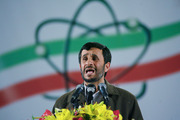 The discovery that Iran’s regime has, yet again, deceived the international community and secretly built an additional nuclear facility has made world leaders re-focus on the issue. On Friday, the US, UK and France said the UN had to be given immediate access and urged tough new sanctions. Even Russia expressed concern.
The discovery that Iran’s regime has, yet again, deceived the international community and secretly built an additional nuclear facility has made world leaders re-focus on the issue. On Friday, the US, UK and France said the UN had to be given immediate access and urged tough new sanctions. Even Russia expressed concern.
Today, the Iranian regime’s response came. According to Ali Akbar Salehi, who heads the Atomic Energy Organisation, Iran will keep its uranium enrichment level at up to five percent – much lower than bomb-grade. “We don’t want to change the arrangement of five-percent enrichment merely to produce 150 to 300 kilos of 20-percent (enriched) fuel,” ILNA news agency quoted the nuclear chief as saying.
This confirms a suspicion I have had for a while – that Iran wants a weaponized nuclear programme, but has realised the disadvantages of such an move and instead has decided to become a “Threshold Power”. Being on the cusp of nuclear power, but never formally crossing the line allows the Iranian regime to continue to play the aggrieved party internally, while denying hawks in Israel and the US conclusive evidence of a violation. Should Iran feel threatened, it would then have the ability to very quickly go all the way. But, for now, it hovers menacingly, unpredictably, but also potentially innocently.
This policy has three advantages for Iran. First, it undermines the creation of a coalition against the regime. With the Iraq War so fresh in people’s minds, even Barack Obama will struggle to convince anyone that US intelligence on Iran’s nuclear programme is conclusive. Second, it gives credit to a policy of engagement. For if Iran is not “there yet”, then there will always be a constituency willing to engage and offer inducements, which the Iranian economy could use. And third, it undermines the approach that worked for nearly half a century with the Soviet Union: deterrence – using the threat of nuclear retaliation and complete destruction to prevent an attack.
But a “threshold power” policy can only work in the short-term. For, unlike a formal programme – which, if history is anything to go by, could encourage a kind of deadly logic along the lines of the US’ and USSR’s Mutually Assured Destruction – hovering suspiciously in a no-man’s land between the nuclear haves and have-nots will encourage other regional countries to develop nuclear programmes. In pursuing a “threshold policy”, Iran may be trying to be too clever by half.






Comments